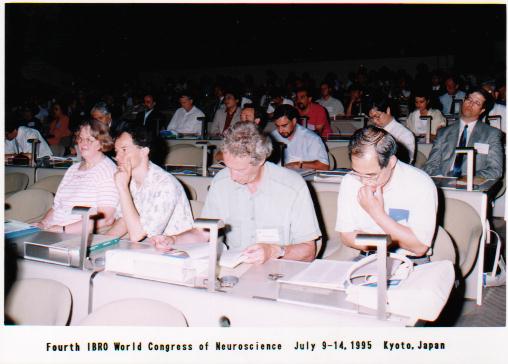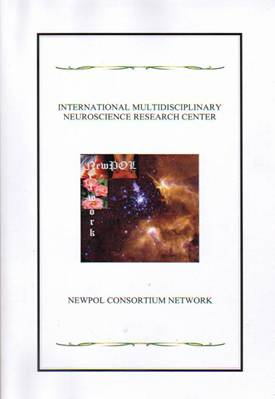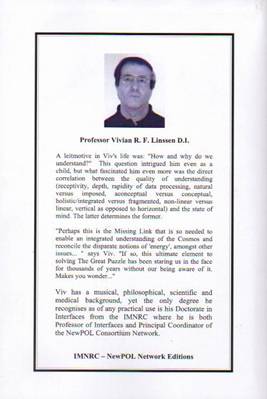
Professor Vivian R. F. Linssen D.I.
Vivian R. F. Linssen - Viv, for short - (on the far right of the picture with a light blue suit and specs: a clearer picture shall soon be available) was born in Brussels and brought up in a culturally eclectic and challenging atmosphere. His French speaking mother Maguy Brasseur of Flemish origin [born in Tienen (Flanders, Belgium) in 1920 – died in Bagnols en Forêt (Var, France) in 2010] was Licenciée & Aggrégée in International Relations, a dynamic defendant of women's rights, studied Chinese till 88 years old, practised Taï Chi Chuan everyday after having overcome a terrible car accident in 1984 and a cancer in 2007, and sculpted human faces (very successful exhibition at the Rouge Cloitre in Brussels and a permanent exhibition in Tervuren at the IMNRC HQ). His father Robert Linssen [born in Brussels in 1911, died in Wavre (Wallonia, Belgium) in 2004] was a well-known writer and expert in Far-Eastern philosophy and also played the piano.
Viv (as was his family) is from the French speaking minority based in Flanders (Flemish Brabant). As such he and his family suffered enormously from the politico-linguistic hatred, apartheid and ostracism exacerbated by Flemish nationalism systematically blocking his endeavours. His mother died prematurely in 2010 because of isolation, sheer chronic stress and total lack of support (excepting from her son, Viv, who was himself completely isolated). Viv on the other hand would have died in 2012 from major cardiac failure because of his shocking living and working conditions in Flanders had he not been taken to hospital by ambulance to the emergency unit. Nobody in Belgium (Flemish or Francophones), the other EU countries, the EU Institutions, the Non EU countries and the media lifted a finger to help him: a complete indifference and absence of solidarity. The case shall be presented before the European Court of Human Rights.
Viv's grandparents came from widely different backgrounds: we find physicians (medical doctors), a brewer, an architect, a colonel (Belgian army), an engineer, a director of the Arsenal in Antwerp and Brussels, the first chocolate factory in Belgium (Lebaigue), ... and multiple decorations earned during the World Wars.
Viv began playing the piano at the age of five. His parents were of the opinion that British education was the best available. He therefore went to England and was admitted to a British Preparatory Boarding School at the age of eight. There he continued his piano and took up violin lessons. He gave his first public performance as a soloist (with orchestra) - Mozart Violin Concerto K216 - at the age of twelve. He was quite good in athletics (won cups) and cricket (second colours). He thought of going to the Menuhin School, but his parents finally decided against it.
He won a top Violin Scholarship to a British Public School where he studied Arts. He won a few prizes to begin with (first of his class and history Prizes), but didn't like the rigid traditional and coercive atmosphere. He was glad to leave after obtaining his O and A levels and after gaining admission to the top violin Class at the Royal Brussels Conservatoire (Belgium) where he obtained his Violin prize (distinction).
He soon felt, however, that there was perhaps something more to Life than just playing the violin nearly 10 (!) hours everyday... Viv was always a perfectionist.
Unfortunately, the unhealthy fragmented narrow-minded educational system in Belgium did not (and still doesn't) favour interdisciplinary training. Holistic integrated interdisciplinary education was (and still is) in the Stone Age.
He married - and divorced (no children) - whilst trying to combine his professional Violin career and degrees in philosophy/biology. His interdisciplinary mindset, mentality and interests were not welcome, berated, denigrated and discouraged by both academia and the artistic community who were (and still are) very unidisciplinary minded. Viv on the other hand disliked the general "institutional" atmosphere, was taken aback by the terribly disconnected way the material was presented to him, the poor teaching quality not to mention the arrogance of academia. This was the time when he began to feel that there was something fundamentally ill-conceived in the Educational System: a fragmented unidisciplinary education was preventing our understanding of the complexity of a holistic interdisciplinary universe and therefore ourselves! Viv was rapidly losing trust in his teachers/professors and as a consequence, in the very data that was presented to him. The loss of trust was thus threefold: loss of trust in the manner in which the material was presented, in the pedagogues and in the data itself.
He thereafter went to Medical School which wasn't perhaps the best choice because of the dictatorial and intimidating atmosphere, proceeded to complete his medical and clinical training, was noticed for his potential as a researcher (in Biochemistry), and strongly encouraged by a professor at Harvard to apply to this university for research but decided - for family reasons - to accept an unconditional offer for a PhD at the University College London (UK). A conventional and highly focussed PhD (neurosciences & microbiology) was however quite insufficient for his needs: an integrated understanding of the infinitesimally small with the infinitesimally large. He therefore developed from scratch an extremely powerful investigating tool - the interface - which has become increasingly recognised throughout the world. This subsequently led to the Master in Interfaces (MI) at the International Multidisciplinary Neuroscience Research Center (IMNRC) where he is Professor of Interfaces and Principal Coordinator of the NewPOL Consortium Network. The MI in turn prepares for the Doctorate in Interfaces (DI) at the International Interface Research Center (IIRC), the IMNRC's successor. His training at the IMNRC developed his interdisciplinary potential and competence far beyond any conventional PhD and MD which are in fact embedded in the DI.
Even though Viv has a musical, philosophical, scientific and
medical background, the only degree he recognises as of any practical value is
the DI. He definitely does NOT wish to have any specific (fragmented)
traditional academic qualification (or label) attached to his name. "A job
or suffix or title puts you in a category that I find unpleasantly stigmatising,
reducing the human being to a skill or qualification. In every human being whether he or
she is living in a back slum in Montevideo or trying to survive somewhere in
Africa there is a latent Leonardo Da Vinci. The human being has far more
potential than what his/her existing occupation or qualifications would lead one
to believe. I am
just a Professor of Interfaces. Period." Viv says. "The
Interface is all you need to understand and therein you shall find all the
knowledge you need. Of course this means the collapse of the existing
educational system worldwide." See also
Education of Tomorrow: Interface Education. Master in Interfaces. Summer
Courses. Registration Open
A leitmotive in Viv's life was: "How and why do we understand?" This question intrigued him even as a child, but what fascinated him even more was the direct correlation between the quality of understanding (receptivity, depth, rapidity of data processing, natural versus imposed, aconceptual versus conceptual, holistic/integrated versus fragmented, non-linear versus linear, vertical as opposed to horizontal) and the state of mind. The latter determines the former.
"Perhaps this is the Missing Link that is so needed to enable an integrated understanding of the Cosmos and reconcile the disparate notions of "energy", amongst other issues... " says Viv. "If so, this ultimate element to solving The Great Puzzle has been staring us in the face for thousands of years without our being aware of it. Makes you wonder..."
Viv first created the International Brain Research Project (I.B.R.P.) back in the early eighties. This project then became the International Neuroscience Research Project (I.N.R.P.). The I.N.R.P. finally gave birth to the International Multidisciplinary Neuroscience Research Center (I.M.N.R.C.) that forms part of the International University Network. In fact, the I.M.N.R.C. is one level above the International University Network... The IMNRC brochure/flyer is available here.
The essentials of his work shall hopefully be published in his book "Physics of Life: The Awakening of Intelligence" (under preparation). The EU Accompanying Measures Proposal NewPOL, the EU Expression of Interest (EoI) NewPOL "The Physics of Life and the Neuroimmunoendocrine System: an integrated understanding of diseases and healing potential in the human being explored using novel approaches to therapy", the NewPOL Consortium Network, the International Multidisciplinary Interface Research Congress and the New Capacity Building Programme (World Society Well Being and Quality of Life Project) have all been inspired from this book.
Asked WHEN (??) this book shall be finally published, Viv replied:
"Perhaps I am not all that motivated to publish "I did this or I found that" anymore. Knowledge is universal. Not "mine", nor "yours". "Physics of Life: The Awakening of Intelligence" has now become a kind of open book - hopefully to become a kind of human world grid - that is constantly changing, periodically updated and modified through interactive participation. This means that in the long run, the book shall "belong" to everyone and no one in particular."
"The trouble is also that 24hrs/day is just not enough. Either you have the time to publish or you don't. I have fallen so far in the latter category. If I had spent my time publishing, I would never have had the time to create the International Multidisciplinary Neuroscience Research Center a.s.b.l.- v.z.w. and take part in other parallel activities. This initiative would also never have been borne. Even though I agree that it may be convenient, please bear in mind that publishing is not a token of quality or originality."
"Some researchers in universities/research institutions do have a tendency to consider themselves Einsteins just because they have published articles: these are the worst and lack the spiritual dimension/personality to become top flight scientists."
"As I once replied in Bionet.neurosciences to a person looking for books on neurology, neuroscience, psychology:
"(...) As far as "psychology" is concerned, there aren't any books I can recommend. Try your own mind. It contains a wealth of information. It's there, waiting for you. And what a fascinating quest it can be!"
"The CNRS editions were quite some time ago interested in publishing the book, but then in 2002 I met two managers from Elsevier Publications. The first manager (with his assistant) took the opportunity of a trip to Belgium to meet me in Tervuren (near Brussels) thanks to my web site http://www.infodiagnosis.com... They then wanted to know something more about my other activities. They seemed very enthusiastic with the idea behind the International Multidisciplinary Neuroscience Research Center and sent down another manager from Amsterdam to see me. They seemed very keen on establishing a life long commercial relationship with me and said that they would support us in every possible way. Not only did they wish to publish the book, but they also agreed to support the NewPOL Consortium Network and publish the Center's journal (PART III of the International Multidisciplinary Interface Research Congress) for worldwide distribution. They offered to get in touch with members of the Consortium to offer their services, enable the NewPOL Network to sell books through our website (thereby enabling us to begin raising funds) and made countless other suggestions to help. I was absolutely delighted and extremely pleased.
Not one promise was held in four years. Nothing concrete ever came out of their written intentions. I feel very strongly about people (or Institutions/Companies/Organisations...) who do not keep their word and manipulate others. They plague society and relationships. Elsevier Publications were therefore dropped and we decided to look elsewhere."
Indeed, the IMNRC - NewPOL Network has now created its own editorial company with its own Board of Editors.
The
first hard copy edition “The Interface Paradigm” (ISBN: 9782960073805) has
completely sold out. We are working on the second edition. Included is a copy of
the front/back cover.


Asked why he doesn't publish in peer reviewed articles/papers, Viv replies: "Well, first my work doesn't fit in any unidisciplinary or pseudo-interdisciplinary publication (peer reviewed or not) and second there are no peer reviewed papers/articles on interfaces to publish in simply because there are no peers in interfaces to review them in the first place." Indeed, there are no peers in "interfaces".
Viv's first website http://www.infodiagnosis.com expresses his own experience, observation and basic philosophy regarding the Life Sciences. Or rather, Life. Judging by the number of questions that he has been (and is) receiving from all over the place through this web site, there is obviously a serious communication problem somewhere...
He first worked on a highly sophisticated integrated educational program leading to the Doctorate in the Life Sciences (D.LSc.) that by definition included Medicine. This soon developed into the extremely ambitious and futuristic Doctorate in Interfaces (D.I.). But as he likes saying:
"In this Degree/Title Obsessed World, I have momentarily kept the suffix but hope to do without it altogether in the not so distant future. Information is a natural process just like other basic physiologic functions... Besides, there is so much to learn and to "know" that bragging about the little that we do "know" seems unwarranted and childish."
"Stay humble inside and outside... "
Vivian Linssen has been regularly invited to attend workshops and conferences, or expose his views in both Academic and NewPOL presentations: China, Slovenia, Ireland, England, Norway, France, Italy, Scotland, Russia, Japan, U.S.A., Hawaii, Rumania, Switzerland, Poland, India, Austria, Sweden, Ukraine, ... and even Belgium!
He also practises TaÏ Chi Chuan, classical, jazz and ballroom dancing, likes travelling, cycling, long walks in the mountains (or in the woods), the sea and visiting museums. He is especially fond of surrealism and loves sushi!
He is now on Facebook and LinkedIn.
***
![]()